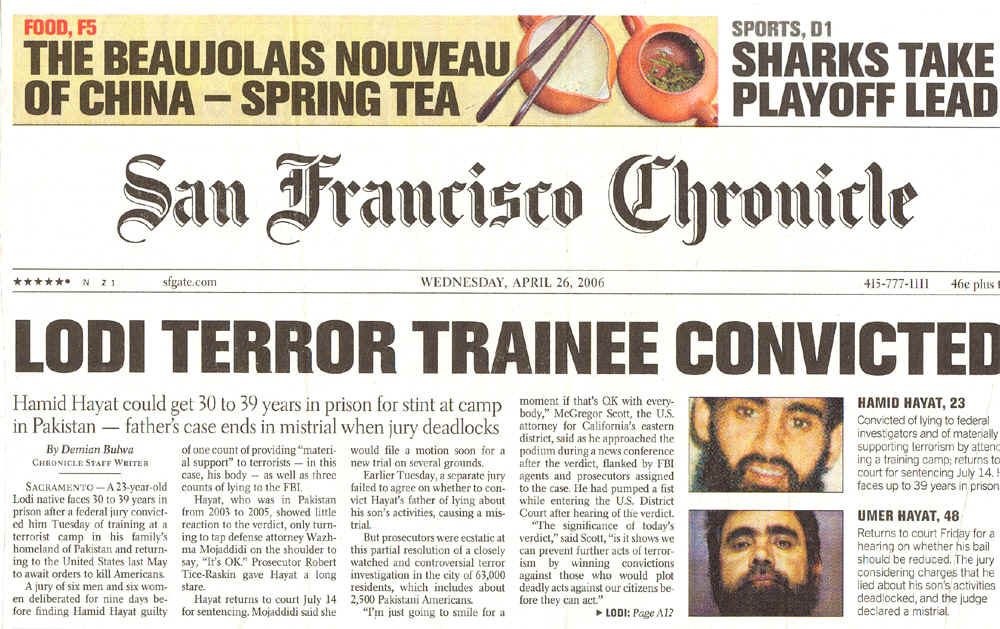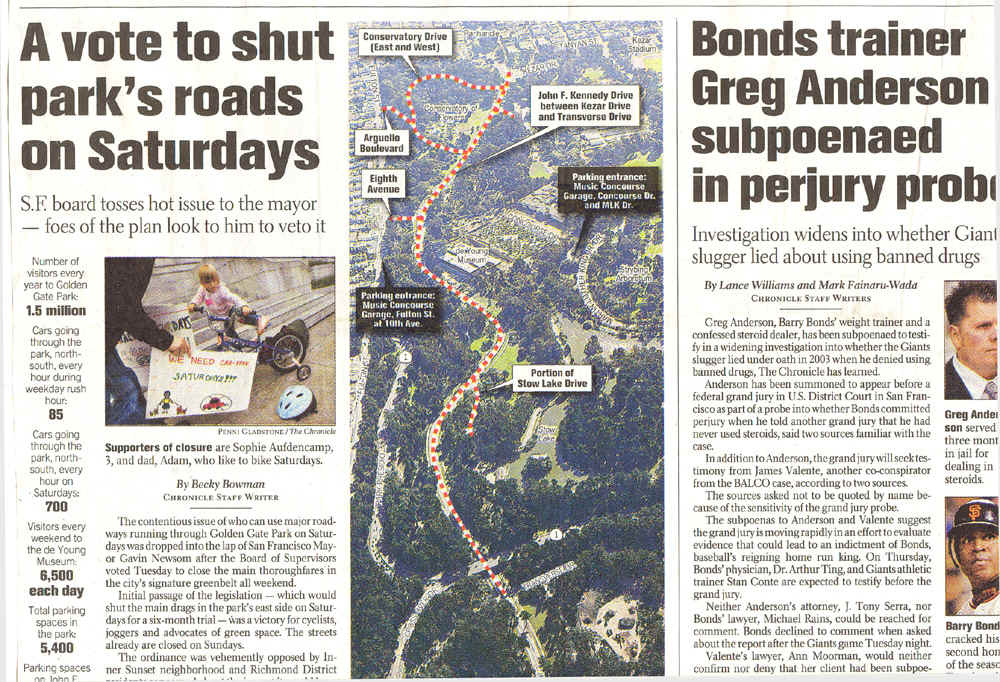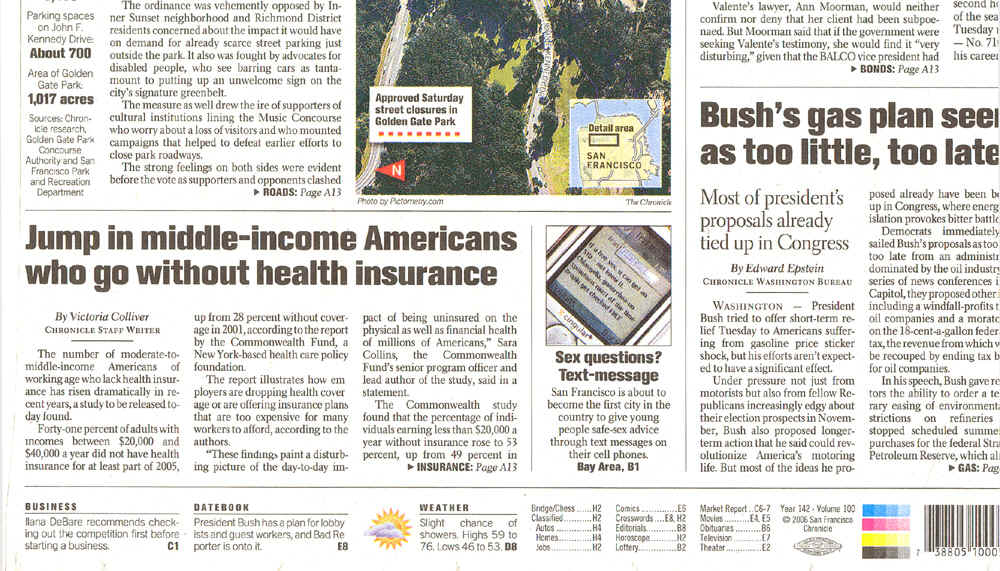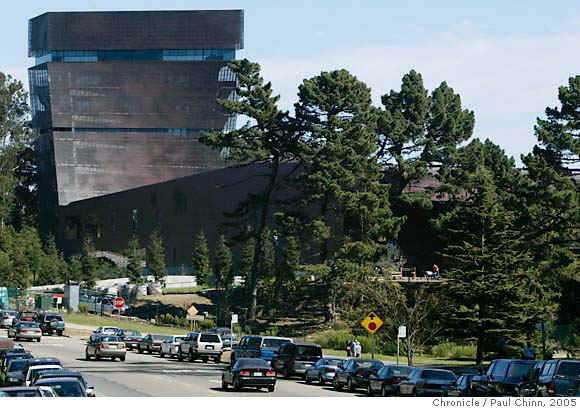   |
   |
A vote to shut park's roads on Saturdays -S.F. board tosses hot issue to the mayorfoes of the plan look to him to veto it |
 |
| The contentious issue of
who can use major roadways running through Golden Gate Park on Saturdays was dropped into
the lap of San Francisco Mayor Gavin Newsom after the Board of Supervisors voted Tuesday
to close the main thoroughfares in the city's signature greenbelt all weekend. Initial passage of the legislation -- which would shut the main drags in the park's east side on Saturdays for a six-month trial -- was a victory for cyclists, joggers and advocates of green space. The streets already are closed on Sundays. The ordinance was vehemently opposed by Inner Sunset neighborhood and Richmond District residents concerned about the impact it would have on demand for already scarce street parking just outside the park. It also was fought by advocates for disabled people, who see barring cars as tantamount to putting up an unwelcome sign on the city's signature greenbelt. The measure as well drew the ire of supporters of cultural institutions lining the Music Concourse who worry about a loss of visitors and who mounted campaigns that helped to defeat earlier efforts to close park roadways. The strong feelings on both sides were evident before the vote as supporters and opponents clashed during dueling news conferences on the steps of City Hall. And though the measure still needs a second board vote to become law, the two sides are now turning their attention to Newsom. "I can't see a way that he could veto this and then stand up with a straight face and talk about public health," said Leah Shahum, executive director of the San Francisco Bicycle Coalition and the mayor's new appointee to the city Municipal Transportation Authority board. But Ron Miguel said that if the mayor is thinking about everybody in the city and whether they can use Golden Gate Park he can't let the legislation become law. "It's traffic-based, it's not people-based," said Miguel, president of the Planning Association for the Richmond. "It's people, not cars, that use the park." The only comments issued for the record by the mayor's office Tuesday were noncommittal, saying Newsom didn't want to prejudge legislation before it comes to him, especially given the possibility it could be amended before a second vote next week. The six-month trial closure would affect 1 1/2 miles of roadway and mimic the Sunday closure of John F. Kennedy Drive between Kezar Drive and Transverse Drive, a routine that has gone on for 39 years and is favored by bicyclists, runners and other parkgoers. During the period, city officials would gather information on changes in park usage, traffic and parking patterns, and adjustments that could be made to public transit to support the program. The supervisors vote in favor was 7-4, with Supervisors Fiona Ma, Bevan Dufty, Michela Alioto-Pier and Sean Elsbernd, all Newsom allies, voting against. An ordinance needs eight votes to pass over a mayor's veto, which gives foes hope and the mayor's office political leverage if it wants to seek changes. During the meeting, Supervisor Jake McGoldrick, who introduced the test run legislation, played a video clip of parkgoers, adults and children alike, using Kennedy Drive under the current Sunday program -- overlaid with the music track, "Saturday in the Park" by Chicago -- eliciting laughs from both the board and the audience. McGoldrick made several last-minute amendments to the measure to ensure that disabled people have access to the park, including a requirement for preliminary reports to the Board of Supervisors three months into the trial period and a provision that would allow intrapark transit shuttles to access Kennedy Drive on both Saturdays and Sundays. The Golden Gate Concourse Authority, a body created to facilitate construction and improvement projects in the park's Music Concourse, already runs a free shuttle from May to October. The concourse authority will work with the board, the mayor's office and the Recreation and Park Department to cater the service to the new Saturday closures, said Mike Ellzey, the authority's executive director. The free shuttle service, however, will run out of funding after October. Supporters are looking for sources of new money. The legislation also provides for a drop-off zone for the disabled on Bowling Green Drive, as well as up to 18 accessible parking spaces near the closed area, and clear signs describing disabled access points. Advocates have argued that people with disabilities would have difficulty accessing the park and its cultural institutions if roads were closed on Saturdays. McGoldrick, who opposed the road closures three years ago, introduced legislation calling for the trial run in February, saying the opening of the Music Concourse Garage had made the program viable. Ma, who voted against, said closing the park roads was rejected by voters in 2000 and to now pass an ordinance would fly in the face of the will of the electorate. "They didn't want to limit access to the park or its amenities on Saturdays," Ma said. After the vote Tuesday, supporters of the plan, called Healthy Saturdays, applauded and signed thank you notes to supervisors outside he board's chambers. Residents of the Richmond and Sunset districts, however, have said McGoldrick hasn't listened to their worries about the impact on neighborhood streets and businesses. "It's going to be unhealthy Saturdays in the Inner Richmond," said Michele Stratton, co-chairwoman of the North Park Neighbors Association. Cars that cannot find free parking in the park will look for it on neighborhood streets, she said. Patrons and supporters of the park's cultural institutions also have argued that the program would reduce visits to the M.H. de Young Memorial Museum and the Conservatory of Flowers, saying Sunday closures already had affected attendance numbers. The conservatory might not be able to afford programs such as the current "Butterfly Zone: Plants and Pollinators" exhibit if revenue were further reduced, said Rebecca Green, a member of the San Francisco Parks Trust Board of Trustees. Saturday closure advocates, however, said that attendance figures released by the de Young actually show Sunday average attendance to be slightly higher than average Saturday attendance. Hours before the vote, a verbal clash between supporters and opponents took place in front of City Hall at competing news conferences. It came to a head as street-closure advocate David G. Miles Jr., a longtime supporter of the Healthy Saturdays program, used an amplifier to ask the opponents to vacate the steps. "Excuse me, there's another press conference here that starts at 12:30," Miles said into a microphone at several minutes past that time, drowning out an opponent at the podium. |